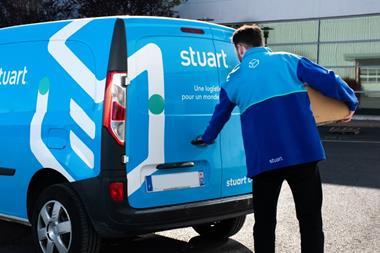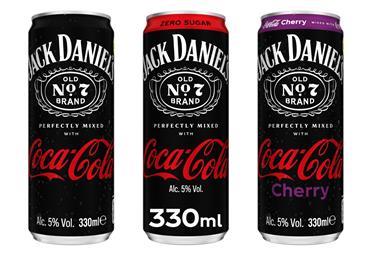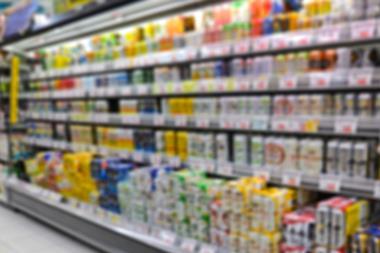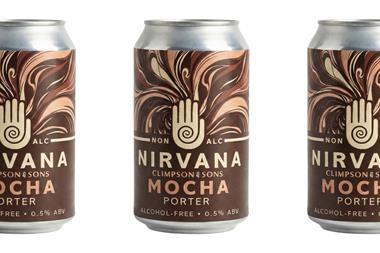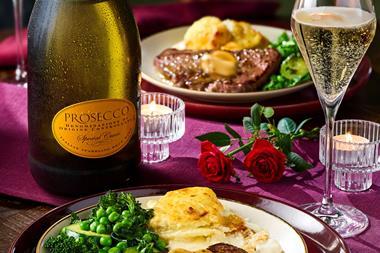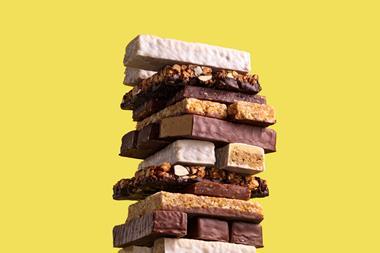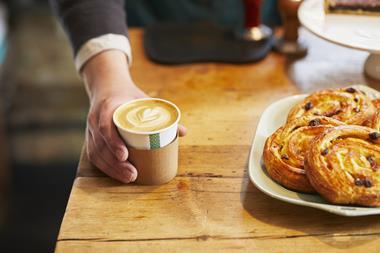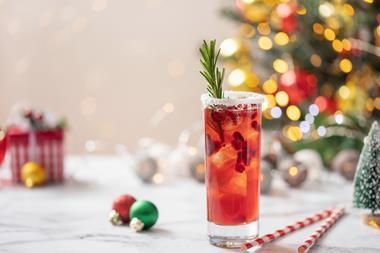Wine has not had it easy lately, with the double whammy of duty and low consumer confidence corking sustained growth. Tax and duty have driven up value by 1.3%, although it is perhaps more telling that volume has declined by 2.4% in the year to February (Nielsen MAT).
60%
That’s the percentage of wine shoppers who are willing to purchase premium, according to Pernod Ricard UK
However, just because taxes are pushing up prices, don’t be put off by premium-priced wine. Bottles priced at £7-£8 are growing at 13% in impulse, while £8-plus bottles are up 14% (Nielsen), and the two price points’ share of the impulse market has soared by about 15% in the past year.
Pernod Ricard UK commercial wine director Chris Ellis says the continued trend towards premiumisation is being driven by consumers seeking to recreate the entertainment of a night out at home. “According to our research, nearly 60% of wine shoppers are willing to purchase premium wine - contrary to the suggestion that consumers are only purchasing value wines,” he says. “Independent convenience retailers should therefore ensure that they stock a range of premium wines in order to capitalise on this trend, especially as premium wine on average returns £2.69 per bottle (Nielsen).”
Treasury Wine Estates senior category and insights manager Nicola Frinneby-Wake highlights the impact duty is having on low-end wines. “Over half of a bottle of £5 wine is tax and duty, which decreases to just over a third for a £10 bottle,” she says. But she highlights a ‘two nations’ trend in the category, in which the middle ground is getting lost and discounters are grabbing an increasing share of the low-end market. Nevertheless, lower priced wines are experiencing a decline in volume and value sales (down 5% and 3.8% respectively, Nielsen) and are subsequently increasing in average price, Ellis points out.
Stocking the right brand is a good start, especially given its importance to wine shoppers in convenience stores. Percy Fox marketing manager Rachel O’Shea points out that 25% of respondents to a recent survey said brand was the most important factor in buying wine in convenience, compared with 22% who said price (Truth research).
Retailer’s view
“Wine is going very well, although we have to actively promote it. We supplement the Best-one promotions with our own, focusing especially on wines that aren’t selling well by highlighting them on a blackboard, or reducing the price. We also host wine tastings in which suppliers come along and talk about their products. We don’t charge for them, but last time everyone bought a case. It’s really helped our higher-priced wines (£10-plus). We try to do things differently to the multiples.
“People are buying cheaper or more expensive wines, so brands such as Jacob’s Creek have slowed. We always have to work harder for them on a deal. Premium is selling well because people travel quite far to come here because our reputation has grown. But £3.99 bottles are also selling well.
“At the higher end, New Zealand sauvignon blanc is a good seller, and we sell case-loads of Oyster Bay when we reduce it from £10 to £7. Low-alcohol wine is not jumping off the shelves - it’s not big in Scotland yet, but things may change.”
Donna Morgan, Brownlie’s of Biggar, Scotland
Accolade Wines European marketing director Clare Griffiths also stresses the importance of brand. “Our WineNation report 2012, which combined a study of 50,000 UK wine drinkers with data and insight from Nielsen, CGA and Kantar, revealed that when it comes to deciding to purchase wine, brand is a stronger driver than country of origin for consumers new to wine, established wine drinkers, those who drink wine occasionally and less frequent value-conscious drinkers,” she says.
This is not to say that value is not a vital factor, but this shouldn’t mean driving down prices, Griffiths adds. “In 2013 shoppers will continue to have less disposable income and therefore they will be looking for value for money when purchasing wine. However, this isn’t about selling wine cheaply. This is about making sure we give the consumer the best possible wine at every price point.”
Donna Morgan, owner of Best-one store Brownlie’s of Biggar in Scotland, agrees that the market has become more polarised, with premium wines selling well, although she has to work hard at promoting them. “At the higher end, New Zealand sauvignon blanc is a good seller, and we sell case-loads of Oyster Bay when we reduce it from £10 to £7, while the £3.99 wines are also selling well. However, the middle ground is slowing down a bit - people are buying cheaper or more expensive.” She says her top seller is probably Gallo, which retails at about £5.50.
Blossom Hill is currently the UK’s number one wine brand (Nielsen Scantrack) and the number one brand among the 100 independent convenience retailers polled in a recent C-Store-commissioned HIM survey, which questioned retailers on their perception of top sellers. Echo Falls, Gallo Family Vineyards, Hardys and Jacob’s Creek were also top sellers in C-Store’s Top Convenience Products survey, while premium wines such as Lindeman’s is an emerging force. The New Zealand brand is up 8% in value and 6% in volume in impulse (Nielsen). Yellow Tail is also experiencing strong growth, up 73.5% in value in total off trade and now a top 10 Australian wine brand in this country.
In fact, Australia is the largest country of origin by volume, with a 20% share of the convenience market, followed by Italy (17%) and the US (13%)(Nielsen MAT February 2, 2013). Australian wine also delivers an average unit price of £5.08, which is above the market average of £5, according to Treasury Wine Estates.
While Australian wine may be the biggest seller, it is arguable that US wine is perceived to be the most popular, according to Accolade Wine’s WineNation Report and C-Store’s Top Convenience Products survey, which found that the top three wine brands were American: Blossom Hill Echo Falls and Gallo Family Vineyards.
Tried and tested
Stocking brands that people trust is becoming increasingly important, too, especially in the wake of the horsemeat scandal, says Treasury’s Frinneby-Wake. “Trust is the next currency in wine. Convenience needs to demonstrate authenticity, and brands can play an important part in establishing and building trust,” she says.
Treasury category manager Rupert Owen adds: “The issue of trust is a hot topic at the moment across all categories shoppers are asking more questions about where their consumables are coming from. It is only natural the issue of provenance in wine will grow in concern, leading to questions regarding grape sourcing.”
Talking about the provenance on the label is a good way of building trust, and one demonstrated on brands such as Lindeman’s and Beringer. “As the oldest and most awarded winery in Napa, Beringer is a trusted brand among consumers, and we continue to ensure our grapes and winemaking practices are of the highest quality,” Owen says.
Wine type
Rosé continues to be one of the real success stories of the UK wine category and is a key driver of the impulse market. “Rosé also caters to the growing number of younger drinkers who tend to gravitate towards sweeter styles when making their drinks choices,” says Percy Fox’s O’Shea. “Retailers should capitalise on this trend by stocking the best sellers, such as Blossom Hill White Zinfandel, which is the UK’s best-selling rosé.”
Treasury Wine Estates says sparkling wine is the “hero” of the wine industry, with year-on-year value growth of 11% and volume growth of 8% in off trade. Spain is the biggest growth area, driven by the success of cava.
Pernod Ricard research found that 67% of total sparkling wine consumers prefer a sweeter style of sparkling wine that is fruitier in taste and lower in acidity, dryness and bitterness, Ellis says. “Stocking wines such as the Jacob’s Creek Sparkling Moscato range allows retailers to tap into this opportunity and offer consumers an alternative when treating themselves mid-week,” he adds.
Moscato is an up-and-coming variant which is providing double-digit growth opportunities, says Treasury’s Owen. E&J Gallo’s general manager Bill Roberts adds that moscato has “exploded” in the US, and the company promises to invest in Gallo Family Vineyards in the UK to capitalise on the opportunity for a similar success story in the UK. As such, E&J Gallo has launched Barefoot Pink Moscato, adding to the Gallo Family Pink Moscato.
Low-alcohol ‘wine-based’ drinks have experienced rapid growth in the past year, with 29% volume and 27% value growth, and are now worth £38m in the UK, says Accolade. “The biggest potential for growth out of the low-alcohol category comes from regular female wine drinkers who might be looking to cut down on their alcohol and calorie intake during the week,” says Griffiths. “These are consumers who tend to drink wine two to three times per week and are very conscious of diet and calories.”
Wine distributors are getting in on the act, having launched a plethora of low-alcohol variants in recent months. Percy Fox has introduced Blossom Hill Vie (5.5% abv) in two variants - white, with hints of citrus, pear and apricot flavours and rosé, with a floral aroma, ripe peach and strawberry flavours.
Five simple steps to help convenience retailers grow sales:
1. Stock best-selling premium brands
2. Cover a range of price points and variants for a balanced range and to keep customers coming back
3. Remember, not more products but the right products
4. Refrigerate - if it is not cold it is not sold!
5. Regularly review your range to identify slow sellers and allocate appropriate space for promotional lines and higher value wines.
Source: Treasury Wine Estates
O’Shea says many existing offerings suffer from a poor taste perception, so there is considerable market capacity for a better-tasting product. “Pre-launch research by Blossom Hill showed that among those consumers who already bought into the category, taste was a key issue, with 63% rating existing reduced-alcohol, wine-based drinks as ‘average’ to ‘very average’ in quality. Blossom Hill Vie was therefore created to fill a gap in the market for a great-tasting lower alcohol solution,” she says, adding that feedback on Blossom Hill Vie has so far been positive. One small store retailer has grown their alcohol sales by 170%, with Blossom Hill Vie capturing a 70% share of the category (retailer epos data, December 2012), she asserts.
Accolade has brought Banrock Station Light White and Rosé to the market, both at 5.5% abv, as well as a ready-to-serve ‘sparkling collection’ range. The line-up includes the Hardys Peach Bellini, Hardys Strawberry Bellini and Banrock Station Infusion Summer Berries, all at 5.5% abv and Echo Falls Spritz pinot grigio and Echo Falls Spritz white zinfandel rosé at 4% abv.
“Wine continues to broaden its appeal and these cans are set to bring in new wine shoppers, making it relevant to younger consumers and current non-wine buyers. They are a truly female-oriented solution in a male-biased RTS sector,” says Griffiths.
Elsewhere, Gallo Family Vineyards has launched Summer White (abv 5.5%), with Roberts citing figures showing that 43% of consumers would opt in favour of lighter styles of traditional wines (E&J Gallo Winery Quantitative Test Research).
In terms of merchandising lower-alcohol variants, Treasury Wine Estates recommends moving variants such as moscato next to other sweeter alcohol. “Place moscato and the like alongside sweeter products such as Kopparberg - people would be open to that concept,” says Frinneby-Wake. “If you market them as low alcohol, they won’t work.”
In other developments, Gallo will continue its Gallo Film Club initiative in 2013 to drive consumer brand engagement and trial. The Club aims to sign up 25,000 new customers to the project this year, with the initiative supported by an on-pack neck collar promotion - running on bottles of Summer Red and moscato - from September onwards. Promotional codes offering consumers a complementary DVD with every purchase will be redeemable online through the Gallo Film Club website.
Pernod Ricard’s popular Rioja brand Campo Viejo is evolving its packaging to achieve greater stand out. Available from July, the new-look bottles include gold embossing, incorporation of the wine-makers’ signature, individual batch numbers, and more premium paper used on the label.•
Ones to watch
Mark of success
Campo Viejo, the UK’s favourite Rioja brand (Nielsen), has been launched with a £6.99 pricemark. The brand’s Tempranillo variant carries the pricemarking and is available across all channels, says Pernod Ricard UK. The pack is supported with a POS package. Campo Viejo is currently outperforming the Rioja category, up 28.5% in volume and 23.9% in value against 3.7% volume and 7.2% in value for Rioja overall, according to Nielsen.
tel: 020 8538 4484
Taste of summer
Gallo Family Vineyards has launched Summer White, a 5.5% abv wine-based offering for consumers who enjoy lighter and fruitier styles.
It follows the success of Gallo Family Vineyards Summer Red, which was introduced in 2011. Summer White has been supported by an integrated communications campaign, including sampling, PR, trade marketing, social media activity and advertising.
rrp: £6.99
tel: 01895 813444
Short and sweet
Blossom Hill has launched its first range of 50cl bottle formats.
Designed to meet a shopper need for a variety of pack formats to suit the mid-week occasion, the range includes the best-selling Soft and Fruity Classics Red, Crisp and Fruity Classics White, and the White Zinfandel Rose. The company says the 50cl format is suited to shorter drinking occasions and therefore meets the ‘something for tonight’ mission.
tel: 08457 515101
Trust in wine
Banrock Station recently embarked on a major conservation project in conjunction with the National Trust. Launched in March and running for 18 months, the campaign encourages consumers to vote for their favourite National Trust project, with the winner receiving the largest share of a £100,000 donation. Special packs of shiraz mataro and colombard chardonnay offer the chance to win one of 30,000 single-use National Trust passes.
tel: 01483 690 000
Source
Robin Mannering






















